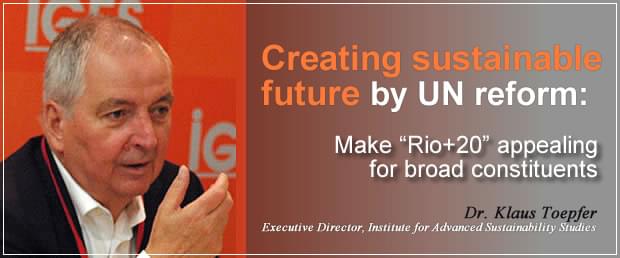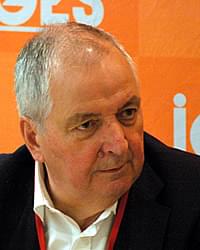|  |
Improving global environmental governance is a formidable task due to UN system complexity as well as the intrinsic nature of environmental governance which often contains conflicting interests within and with other issue areas. The objective of the interview was to comprehend and find out keys for solution by listening to valuable perspectives of one of the best known, experienced figures in the field – Dr. Klaus Toepfer. The interview included perspectives towards Rio+20, as well as highlighting the Fukushima nuclear power plant accident. Dr. Toepfer also gave his valuable views on Japan energy policy based on his wealth of experience in Germany. |
 | Dr. Klaus Toepfer
Executive Director, Institute for Advanced Sustainability Studies |
|
Fukushima Impact on Global Energy Sector
---What are your observations on the impact of post-Fukushima socio-political developments in Japan catalysing and anti-nuclear sentiments across the world and its position in the global energy mix?
Dr. Toepfer:
It is true that nuclear energy has been an important development process up until today for many countries. However, the Fukushima incident demonstrated the substantial risk that nuclear power poses and stimulated us to think whether or not nuclear power dependency is an acceptable option.
In shifting energy sources from nuclear, it is necessary to develop alternative resources, even if this means higher costs. However, you must think of what such “costs” include. Can you say that solar energy is that expensive? Once I visited the office of the CEO of a solar company, and there was a picture of a destroyed solar cell on the wall. I was told that it exhibits “the worst accident of solar energy”. Indeed, while the consequences of solar energy destruction are limited, the risk posed by a nuclear power plant accident is huge – and this is just one example where it is very difficult to draw a line regarding which costs are associated with a given technology and which are not.
---Russian supplies more than 25% gas to Germany, which makes Germany’s energy sector vulnerable to geopolitical risks in the region. How would Germany address the geopolitical concerns if nuclear power, which is currently a major source of electricity, is removed from its energy mix? How do you cope up with possible supply source shortage?
Dr. Toepfer:
Geopolitics is a very important dimension. As Germany depends on Russian natural gas, Russia depends on the German market. Responding to Russian needs, German companies are joining them for technical cooperation. Therefore, Russia and German are mutually dependent mutually. We do not think that this is a dangerous situation. Economic interaction can serve also as a basis for political cooperation and importing gas from Russia is only one part of such cooperative activities.
Having said this, historically Germany has been a big energy-importing country and we are aware of the energy dependency problem. Thus it is crucial to promote enough renewable energy as well as diversify to energy resources.
UN system and Rio+20
---What are your views on current UN system? What are the strengths and weaknesses and how these challenges can be solved? What should be decided at Rio+20?
Dr. Toepfer:
Let me start with explaining a bit about the complex UN system. UN is not an entity in its own right but an entity that belongs to the member states. We always need to remember this. The UN has two pillars. One is the UN system that is one country, one vote. The other pillar is Bretton Woods consisting of the World Bank and IMF where the voting system is one dollar one vote. Clearly, the decision-making capacity can be more intensive in the one dollar, one vote system than in the one country, one vote system. Yet another example is in United Nations Security Council where five permanent members have power to veto any substantive resolution. The selection of these countries was heavily influenced by history, i.e. the results of the Second World War.
With this complicated system and historical background, any UN reform is pretty difficult particularly when a UN Charter change is required. Let me give you an example. The UN has three councils: the Security Council, the Economic and Social Council (ECOSOC), and the Trusteeship Council (*1). The Trusteeship Council has now suspended its operations, with the independence of Palau. In other words, it currently doesn’t have any work. When the Rio Summit took place in 1992, I was the chairman of the German delegation. We backed up an idea to turn the Trusteeship Council into something like an instrument for trusteeship for global commons. It was a very good idea. However, changing the Charter was necessary and nobody wanted to do it. Therefore, any reform direction should be considered very carefully.
We are now trying to change the ingredients of the United Nation ECOSOC. The UN Commission on Sustainable Development (CSD) is a subsidiary body to ECOSOC. Let me give an example of the current problems of ECOSOC and CSD. When I was the president of CSD, after much difficult negotiation and discussion, we created a paper. I found out that I needed to submit the paper to the chairman of the ECOSOC. However, our ambassador in New York said “don’t bother to submit the paper because it has no political influence”. Anyway, I went to the ECOSOC at the UN headquarters in New York City. But what he said was true. No ambassador was there and no discussion was going on. Therefore, the consequences of submitting the paper were close to nothing. Therefore, ECOSOC needs to be reformed to be an effective pillar in the sustainable development field, including the environment.
Clearly, development is the priority for developing countries. They claim that developed countries came back to the developing countries after they accomplished their own development and now create a burden for them. In this regard, the Indian Prime Minister Indira Gandhi made her very famous speech in 1972 at Stockholm U.N. Conference of Human Environment. We should not be too demanding to hamper their developing process.
Currently, the burdens for developing countries are huge. Environmental issues such as waste, soil, water, air and chemicals are managed by different institutions with multiple treaties and conventions for each issue. It causes serious problems in developing countries because they do not have many specialists with only one or two experts for each issue. Due to this limited capacity, it is impossible for them to handle multiple issues and treaties. Therefore, having some kinds of an umbrella structure might indeed be a step in the right direction.
It is crucial to make CSD and Rio+20 attractive to non-environment Ministers. For example, they do not come to CSD because they expect the topic is, ultimately, about the environment. Finance ministers do not come because they know they are always asked to pay more money. This situation needs to be changed. Even though it is very good to strengthen the role of the environment, we should avoid giving a signal that, at the end of the day, Rio+20 is, again, an environmental conference.
The name “Rio+20” is inappropriate as the idea implicates that we are going backwards. Alternatively, “Rio20 +“is preferable to highlight the future and to attract the younger generation.
(*1) For more details, see: http://www.un.org/en/mainbodies/trusteeship/
--- How can different environmental issues be addressed in the UN system? For example, the UNDP has rich financial resources while UNEP has a strong normative component. Is it possible to have some kind of consolidated, harmonized coordination between institutes?
Dr. Toepfer:
Many people, organisations and institutes ask for such coordination. However, the critical issue is, nobody wanted to be coordinated. Coordination is a very demanding topic. This is indeed a huge problem in the UN system.
--- The Global Environmental Facility (GEF) seems to pay more focus attention to on UNDP, World Bank, than to UNEP program. Why is this the caseso?
Dr. Toepfer:
GEF is one of the results of Rio Summit in 1992. In general, developing countries sign a contract for a GEF project after financial resources are secured. The idea behind the GEF creation was to pay additional costs for a project if environmental sustainability is taking into account. When I was responsible for UNEP, we were at least an equal partner or so-called implementing agency and I see no sign why this should have changed in the meantime.
Multi-stakeholder participation
--- What are some considerations that can improve participation and access to information on environmental decision-making at the national level?
Dr. Toepfer:
A multi-stakeholder process is now common sense. In Germany, we have effective regulation to implement such processes. However, you must be very careful when conducting it. Participants get upset if they are involved in a decision-making process when the decision is almost done. My strong recommendation is to involve stakeholders at the very early stages. High motivation is a critical element for the success of the process. Furthermore, make the process transparent and do not misuse the fact that they are simply participating for political intention.
Observation by interviewer
Being one of the prominent personalities who did not shy away from confronting the nuclear industry in Germany in the post-Chernobyl, Dr Toepfer’s views against the use of nuclear energy can be of significant importance to developing nations. His view is that although many nations in developing Asia are promoting nuclear power to meet their growing energy demand, exploring alternative sources could be wiser decision for long-term energy security.
Dr. Toepfer’s perspectives seem to contain one profound and consistent philosophy – inclusiveness: inclusiveness of people, ministries, institutes, and countries with different perspectives and interests, and bringing them to the same discussion table. This notion would be vital to break deadlocks and improve environmental governance. He emphasised the importance of attending to different interests at Rio+20, namely developing countries, non-environment ministers, and the younger generation. His philosophy is articulated by the following words during his interview “I hate these abbreviations like ECOSOC and CSD because they are for the knowledgeable people and hence they are exclusive, or exclude others. If you visited my office in Nairobi, you would see the sign “You are entering an abbreviations-free zone”.
Facilitator: Jusen Asuka(IGES)
Interviewers: Nanda Kumar Janardhanan, Mikiko Shimaoka (IGES)
|
About "ISAP2011 Interactive Sessions"
ISAP Interactive Sessions inviting selected guests were convened back-to-back with the third International Forum for Sustainable Asia and the Pacific (ISAP2011). A series of meetings intends to facilitate close dialogues between guest speakers and IGES researchers. It also intended to facilitate discussions between the guests and audiences in a participatory manner. Each meeting was designed to have: (i) an interview session conducted by IGES young researchers to get in-depth understanding on the views and opinions of the guest speakers; and (ii) a Q&A session with the audiences. |
|
| | |
|

